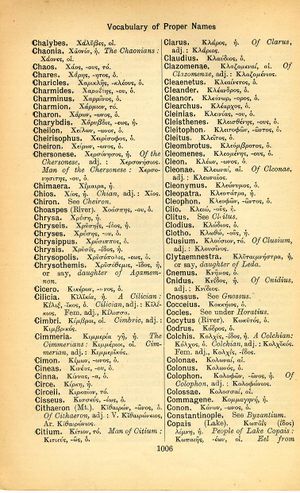Cleopatra
Βίου δικαίου γίγνεται τέλος καλόν → Vitae colentis aequa, pulcher exitus → Ein Leben, das gerecht verläuft, das endet schön
English > Greek (Woodhouse)
Κλεοπάτρα, ἡ.
Latin > English (Lewis & Short)
Clĕŏpātră: (on the ā cf. Juv. 2, 109; Luc. 9, 1071; 10, 56; Stat. S. 3, 2, 120), ae, f., = Κλεοπάτρα.
I Queen of Egypt, and daughter of Ptolemy Auletes, notorious for her amorous intercourse with Cœsar, and afterwards with Antony; conquered at Actium by Augustus, Caes. B. C. 3, 103; 3, 107; Suet. Caes. 35; Luc. 10, 354 sqq.; Val. Fl. 4, 464; Mart. 4, 22, 2; 4, 59, 5.—Hence,
B Clĕŏpātrānus, a, um, adj., of or pertaining to Cleopatra: stirps, Treb. Poll. Claud. 1: uniones, id. Trig. Syr. 32.—
II A sister of Alexander the Great, and wife of Alexander, king of Epirus, Liv. 8, 24, 17; Just. 9, 6, 1; 13, 6, 4 al.—
III A daughter of Mithridates, and wife of Tigranes, Just. 38, 3, 3.—
A daughter of I., Just. 39, 3, 1; 39, 4, 7.
Latin > French (Gaffiot 2016)
Clĕŏpătra,¹² æ, f. (Κλεοπάτρα), Cléopâtre,
1 reine d’Égypte : Suet. Cæs. 35, 1
2 l’une des Danaïdes : Hyg. Fab. 170.

